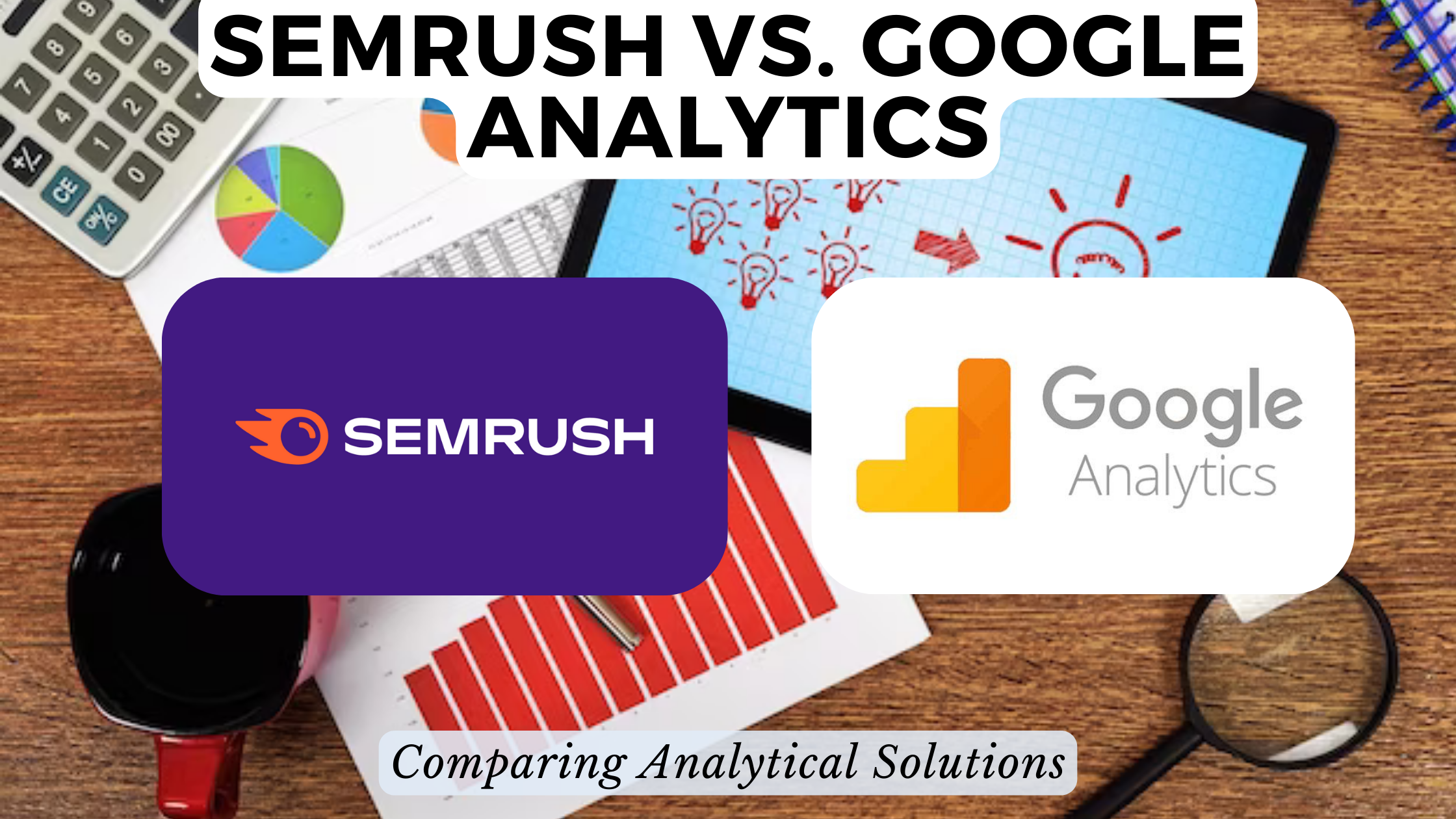Semrush vs. Google Analytics: Comparing Analytical Solutions
-


Semrush vs. Google Analytics: Comparing Analytical Solutions
Navigating the digital landscape demands robust analytical tools, and two heavyweights in the arena are Semrush and Google Analytics. In this insightful comparison, we explore the strengths of each platform, shedding light on why Semrush emerges as a compelling choice over Google Analytics.
Understanding the Analytical Battlefield
Before we delve into the comparison, it’s crucial to understand the unique roles Semrush and Google Analytics play in the analytical battlefield. While Google Analytics is a stalwart in website traffic analysis, Semrush extends its capabilities to encompass broader aspects of digital marketing, including SEO, keyword research, and competitor analysis.
Semrush: Unveiling a Holistic Approach
- Comprehensive SEO Toolkit: Semrush is renowned for its all-encompassing SEO toolkit. It goes beyond the traditional analytics scope by offering features such as keyword research, backlink analysis, and competitor tracking. This holistic approach empowers users to optimize their digital presence strategically.
- Competitor Analysis: One of Semrush’s standout features is its robust competitor analysis capabilities. Users can gain valuable insights into the strategies of competitors, identifying keywords, traffic sources, and backlink strategies. This competitive intelligence is instrumental for staying ahead in the digital race.
- Content Marketing Insights: Semrush excels in providing content marketing insights. Users can uncover high-performing topics, analyze the content strategies of competitors, and optimize their own content for maximum impact. This content-centric approach complements traditional analytics, offering a more nuanced understanding of digital assets.
- Social Media Management: Beyond website analytics, Semrush integrates social media management tools. Users can schedule posts, track engagement metrics, and gain a comprehensive view of their social media performance. This integration enhances the platform’s versatility, catering to the multifaceted needs of digital marketers.
- Paid Advertising Intelligence: Semrush extends its reach into paid advertising intelligence, offering features like ad strategy analysis, ad spend insights, and competitor ad tracking. This comprehensive view of paid campaigns adds another layer to the analytical toolkit, enabling data-driven decision-making in the advertising realm.
Google Analytics: The Analytics Powerhouse
- Web Analytics Foundation: Google Analytics remains the foundational powerhouse for web analytics. It provides in-depth insights into website traffic, user behavior, and conversion metrics. For businesses seeking a robust and free web analytics solution, Google Analytics is often the go-to choice.
- E-commerce Tracking: A significant strength of Google Analytics lies in its e-commerce tracking capabilities. Businesses engaged in online sales can utilize features like transaction tracking, product performance analysis, and conversion attribution to optimize their e-commerce strategies.
- Customization and Integration: Google Analytics offers extensive customization options, allowing users to tailor reports and dashboards to their specific needs. Additionally, seamless integration with other Google products, such as Google Ads, provides a unified analytics experience for businesses leveraging multiple Google services.
- Event Tracking and Goals: Businesses can set up custom event tracking and goals in Google Analytics to measure specific interactions and conversions. This flexibility allows organizations to align analytics with their unique business objectives, providing a more tailored and insightful view of performance.
- User-friendly Interface: Google Analytics is renowned for its user-friendly interface, making it accessible to a wide range of users. The platform’s intuitive design and ease of navigation contribute to its popularity as a go-to analytics solution for businesses of all sizes.
Related SaaS Products
1. Semrush: Unveiling the Power of Comprehensive Analytics
Semrush stands out as an all-encompassing analytical solution, offering a holistic view of your digital presence. Explore its capabilities in SEO analytics, keyword tracking, and competitor insights. Semrush goes beyond website traffic, providing a comprehensive suite for marketers to refine strategies based on rich data.
2. Google Analytics: The Web Traffic Maestro
Google Analytics remains synonymous with web analytics, excelling in tracking and reporting website traffic. Delve into its features for audience behavior, traffic sources, and conversion tracking. While focused on website performance, Google Analytics may be perceived as specialized, whereas Semrush offers a broader scope.
3. Ahrefs: Elevating SEO Insights
In the realm of SEO analytics, Ahrefs is a formidable contender. Uncover its prowess in backlink analysis, keyword research, and content exploration. Ahrefs complements Semrush by providing in-depth SEO insights, making it an ideal addition to your analytical toolkit for a more comprehensive digital strategy.
4. Hotjar: Visualizing User Behavior
Hotjar brings a unique dimension by visualizing user behavior. Explore its features for heatmaps, session recordings, and user surveys. While not a direct Semrush alternative, Hotjar enriches your analytical approach by revealing how users interact with your website, providing valuable insights for optimization.
5. Crazy Egg: Optimize with Heatmaps and A/B Testing
Crazy Egg offers a blend of heatmap analytics and A/B testing. Dive into its capabilities for understanding user engagement and optimizing your website’s design. While not an exhaustive replacement for Semrush, Crazy Egg supplements your toolkit with a focus on improving user experience.
Conclusion: Semrush’s Versatility Triumphs
In conclusion, the choice between Semrush and Google Analytics hinges on your digital marketing objectives. Semrush’s versatility, encompassing SEO, content marketing, and competitor analysis, positions it as the preferred choice for marketers seeking a comprehensive solution. Google Analytics excels in web traffic analysis but may require supplementary tools for a holistic digital strategy.
As we transition to the final segment, Subscribed.FYI emerges as the guide in your SaaS journey. By simplifying the exploration of analytical tools, it equips freelancers, agencies, and teams with the insights needed to make informed decisions. Leverage the power of Subscribed.FYI to navigate the SaaS landscape and optimize your digital toolkit.
Relevant Links:








